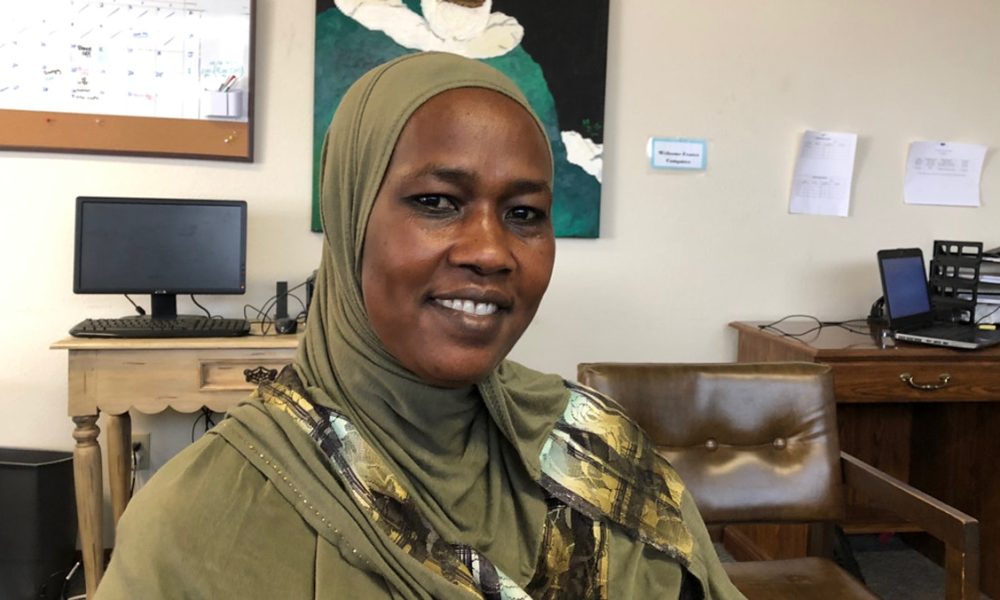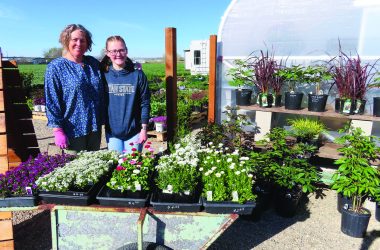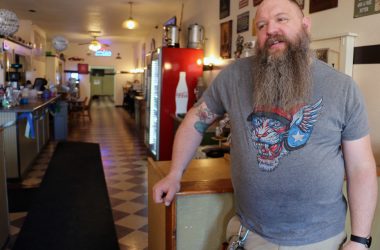
Madja Osman, a native of Sudan, moved to the U.S. with her family five years ago to flee the crisis in Libya. Her family resettled in Twin Falls and moved to Ontario. Since then, she has been a regular client at the Welcome Center. (The Enterprise/Kristine de Leon)
ONTARIO – Jaafar Sadeq sat attentively next to an older man seeking help for a job.
Sadeq, who has professionally worked on computer hardware and cybersecurity, lives in Ontario with his wife and three children.
He works part-time for the city’s nascent refugee Welcome Center and full-time for Walmart. Eventually, Sadeq wants to get a U.S. college degree in computer science engineering to use his skills and eventually work for a big tech company.
Four years ago Sadeq, 29, was living in Iraq, under circumstances that threatened his and his family’s lives.
“I was working for two years with the American Army,” said Sadeq, fixing computers within Baghdad’s Green Zone. “I would go home to see my family every six to seven days. And when I would go home, I had to have guns and security guards to come along and watch over me.”
Sadeq kept his work secret. Only his immediate family knew.
Then one morning, he saw a large paper note by the front door of his house.
“It said ‘We will kill you. We will kill you and your family because you work with the Green Zone,’” Sadeq said. “I called my boss and told him what happened and didn’t go to work after that.”
Sadeq and his family fled to Lebanon and applied for asylum in the U.S.
His wife and kids settled in Ontario a year ago, after having lived in Salt Lake City and El Cajon, Calif. He found the Four Rivers Welcome Center and became one of its four refugee employees to help attract other Arab-speaking refugees.
The Welcome Center, which opened its doors in May, is part of the Portland-based Immigrant and Refugee Community Organization. The center is located at the Four Rivers Health Clinic building in Ontario.
Renee Cummings, the director of the center, said the plan to open began roughly three years ago, when the state Department of Human Services invited staff from the Portland organization to Ontario to “discuss the refugee situation happening in Malheur County.”
The center was initially funded by a grant from the Oregon Refugee and Immigrant Funders Collaborative.
Cummings said she initially had a hard time attracting clients but that changed after she hired local refugees and immigrants.
“In July, IRCO received approval from their state funder to expand services to Malheur County for a short time and they came to Ontario and hired local refugees to assist clients in finding work,” said Cummings.
Sadeq is one of the four employees hired by IRCO to help attract clients to the center. He said he helps around a dozen people a day, many native Arabic speakers.
However, Sadeq might soon have to leave his role. The project funds supporting his work at the center will end Sept. 30, according to IRCO’s Djimet Dogo.
Dogo plans to visit Ontario before the end of the month to discuss the IRCO’s involvement at the center. He will be accompanied by the Department of Human Service’s refugee resettlement program director “to assess the needs of the refugees [in Ontario] and see if DHS can help keep the program” that supports Sadeq and his colleagues funded.
Meanwhile, the center continues to grow in Ontario. Cummings said that there are about 50 refugee families, mostly from Somalia and Iraq.
Although a federal housing program has suspended transfers to and from Ontario, the families are growing and settling.
Madja Osman’s family is one of those families that have planted their roots in Ontario.
Osman is from Sudan and came to the U.S. five years ago to flee Libya, where she had been living at the time with her husband and five children.
Her family had been living in Libya for 15 years until civil war broke out and they were forced to live in the refugee camp. Libya’s former leader, Muammar Qaddafi, had fostered an atmosphere of discrimination and an attitude of suspicion toward the country’s foreign African communities.
“When fighting in Libya started, all people who were Sudanese had to leave, go to the refugee camp,” said Osman, whose family was sent to live in a refugee camp in the Egyptian border post of Salloum, near Libya’s eastern edge. She said her family couldn’t move back to Sudan, which was still enduring unrest and war.
After applying for asylum in the U.S., her family relocated to Twin Falls. Like Sadeq’s family, Osman then moved to Ontario for federally-subsidized housing.
Both Osman and her husband have sought help from the Welcome Center and have made friends with the refugee community in town. But she said there’s always a chance of moving.
“We need somewhere to practice our religion,” said Osman, who traveled everyday to Boise during Ramadan for prayer. “Sometimes people are moving out because they don’t have religion to practice.”
Osman said that a small group of refugees are hoping to open a mosque in Ontario one day.
Sadeq also fluctuates between staying in eastern Oregon and moving to Portland. He said that although he likes the quiet life in the high desert, he misses being in the city, where he is bound to meet more people who can speak his language.
Reporter Kristine de Leon: [email protected] or 541-473-3377.




